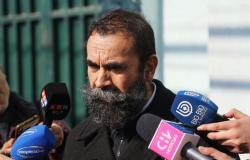
The Prime Minister of Belgium, Alexander de Croo, has announced through tears his resignation from office after the results of the triple electoral day experienced in the country. “It’s a particularly difficult night, we have lost the elections. N-VA and Vlaams Belang are the winners”, he acknowledged.
The regional elections held this Sunday in Belgium gave the victory for the nationalist right (N-VA and Vlaams Belang) in Flanders (north) and French-speaking liberals (MR) in Brussels. In the Wallonia region the situation was less clear at 8:00 p.m. local time because a good part of the votes had yet to be counted, but the partial results also seemed to point to the victory of the MR liberals.
Belgium hosted this Sunday a triple electoral date: federal, regional and European. The predictions predicting a victory for the far-right separatist party Vlaams Belang in Flanders were ultimately not fulfilled despite the good results obtained by that party, and the N-VA, chaired by Bart de Wever, continued to be the most voted in that region. .
At the federal level, the N-VA obtained 22.4% of the votes (according to the results with just over 50% of the votes counted), followed by the Vlaams Belang (17.7%) and the Flemish Socialists of Vooruit (10.5%). Next would be the Flemish Christian Democratic party CD&V (10.3%), the leftists of the PTB/PVDA (9.7%) and the Flemish liberals of Open Vld (6.8%). They would be followed by the Flemish Greens Groen (5.7%), the French-speaking liberals of the MR (4.8%), the French-speaking socialists PS (2.6%), the French-speaking Christian Democrats of Les Engagés (2.0%) and Ecolo (1.7%).
For their part, in Flanders, the nationalists of the N-VA would obtain 25.4% of the votes, followed by the Vlaams Belang (22%) and the Flemish socialists (Vooruit), with 13.4%. Next would be the Flemish Christian Democrats (CD&V), which would obtain 12.3% of the votes, the leftist PVDA, with 9.1% and the liberals of the Open Vld, to which the Belgian prime minister belongs, Alexander De Croowhich would take 7.8%, with little advantage over the Greens, who would get 7.4%.
In Brussels, the French-speaking liberals of the MR would win with 22.4% of the votes, followed by the French-speaking socialists (PS), with 17.8% and in third place the left-wing party PTB, which would take 16, 5 %. In fourth place would be the environmentalists Ecolo, which would obtain 8.9% and the French-speaking Christian democratic party Les Engagés, which would obtain 8.7%.
Lastly, in Wallonia The French-speaking liberals of the MR would prevail, with 33.4% of the votes, followed by the Christian Democrats Les Engagés (21.4%) and the Socialists, who would drop to 20.9%. The left (PTB) would achieve 9.2%, followed by Ecolo (7.9%). In Belgium, 8,359,908 people voted this Sunday, including 244,000 young people between 16 and 17 years old who were able to vote for the first time in the european elections.
In this Sunday’s elections they were elected in Belgium 22 MEPs, 150 federal deputies, 124 members of the Flemish Parliament, 89 members of the Brussels Parliament, 75 members of the Walloon Parliament and 25 members of the Parliament of the German community, in the east of the country.





